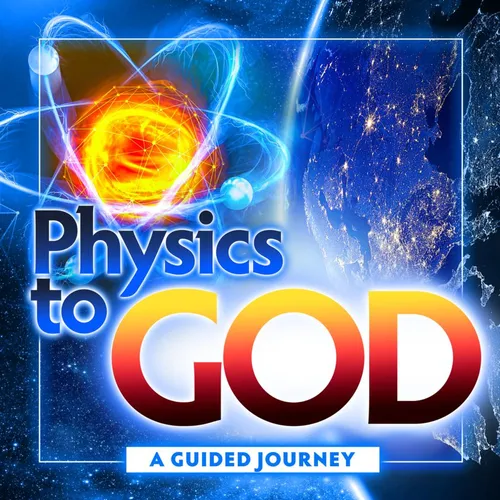
Physics to God
Physics to God is a guided journey through modern physics to discover God. We start from the fine tuning of the constants of nature, travel through the multiverse, and ultimately arrive at a compelling idea of God.
- Update frequency
- every 8 days
- Average duration
- 29 minutes
- Episodes
- 30
- Years Active
- 2023 - 2025

Does God Exist?
Can science convincingly show that God exists? In this episode, we explore one of the most profound questions in human history through the lens of modern physics and philosophy. We lay out a clear ca…

Is the Multiverse Real?
This episode can be seen as a stand-alone summary of our analysis and rejection of the multiverse, or as a review of the main points of this season. It’s perfect for anyone interested in understandin…

Penrose’s Conformal Cyclic Cosmology (CCC) - S2:E16
This episode examines physicist Roger Penrose's extremely wild and imaginative theory for explaining the ridiculously improbable order of the Big Bang without invoking an intelligent cause. Penrose d…

Cyclic Universes and Bouncing Cosmology - S2:E15
Our universe’s initial state was incredibly unlikely, and if it were even slightly different, nothing would exist except for black holes. This episode discusses physicist Paul Steinhardt’s theory of …

Cosmological Natural Selection - S2:E14
Biologist Richard Dawkins, in his book, The Blind Watchmaker, wrote the following:
The theory of evolution by cumulative natural selection is the only theory we know of that is, in principle, capable…

Is Multiverse Science? - S2:E13
Multiverse scientists deviate from the longstanding scientific method, grounded in predictions and observations, by positing infinitely many unobservable parallel universes to explain fine tuning. Th…

Philosophical and Scientific Methods for Multiverse - S2:E12
The scientific method has been the key to the great success of science over the past 300 years, and it’s incredibly important to distinguish it from the philosophical method. You probably learned abo…

The Mathematical Multiverse and the Meta-Measure Problem - S2:E11
If you thought multiverse scientists have difficulty explaining the fine tuning of the constants without God, you won’t believe the trouble they have explaining away the designed laws of nature. The …

The Multiverse’s Measure Problem - S2:E10
In an infinite multiverse, the need to calculate if our universe is typical leads directly to the devastating three-layered measure problem: ad hoc measures are bad ideas to begin with, all intuitive…

Infinities and Measures - S2:E9
In previous episodes, we discussed the multiverse's sole "prediction" that we are typical observers in a typical universe. However, this ignored the major problem that it doesn't seem possible for an…

Boltzmann Brain and Grand Universe Problems - S2:E8
The Boltzmann Brain problem – the multiverse's prediction that you are a randomly fluctuated brain with false memories – sounds like a ridiculous problem. In a sense, it is. But it's nevertheless a m…

The Typical Universe Premise - S2:E7
This episode discusses something many people fail to mention about the multiverse - that it actually makes a prediction.
Well, sort of. You can probably guess that a theory about an infinite number…

Naive Multiverse - S2:E6
This is probably our favorite episode in the series. It was certainly the most fun to record. Together with the next four episodes, it contains the heart of our argument rejecting the multiverse and …

String Theory Multiverse - S2:E5
Multiverse scientists use string theory to support the Varied Multiverse Premise. This episode will evaluate whether or not string theory truly supports the notion that the constants vary between uni…

Fine-Tuning is Evidence for...Multiverse? - S2:E4
Multiverse scientists support the claim that the constants vary by using fine tuning—yes, fine-tuning—the very same evidence we use for the existence of God. While it might sound strange that we come…

Eternal Inflation Multiverse - S2:E3
This episode discusses the Eternal Inflation Multiverse - the strongest support from modern physics for an infinite multiverse. This support comes from the theory of inflation and, in particular, fro…

The Infinite Multiverse Premise - S2:E2
After an introductory discussion about the concept of infinity, this episode considers three lines of evidence that multiverse supporters bring to justify the Infinite Multiverse Premise.
-
Inductiv…

The Three Premises of Multiverse - S2:E1
Season 2: Analyzing & Rejecting Multiverse
This season will clarify the three essential elements of multiverse theory, analyze their various scientific supports, and ultimately show why the multivers…

Three Versions of the Fine Tuning Argument - S1:BONUS
Many people are already familiar with various presentations of the fine-tuning argument in discussions about the existence of God. Standard forms of the argument are often lacking and leave much room…

Summary and FAQ - S1:E10
In this series, we’ve presented three arguments for an intelligent cause: the first from the fine tuning of the constants, the second from the design of the laws, and the third from the initial condi…